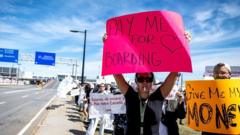In a significant development for Philadelphia, a tentative labor agreement was reached early Wednesday between the city’s mayor, Cherelle Parker, and the American Federation of State, County and Municipal Employees District Council 33, the largest public sector union in the city. This agreement ends an eight-day strike that disrupted trash collection and other essential services in Philadelphia.
In a jubilant announcement made via social media, the union heralded the end of the strike with the message, “The Strike is Over!” The union represents approximately 9,000 municipal employees, including 1,000 sanitation workers who have played a vital role in daily city operations.
Mayor Parker expressed her relief at the resolution, stating, “I have good news tonight for the hard-working men and women of AFSCME District Council 33, and for every taxpaying resident and business in Philadelphia.” The labor dispute, which began on July 1, marked a significant disruption in city services, forcing municipal agencies to reduce operations and even close some public libraries. The strike's most glaring impact was the accumulation of trash, leading to unpleasant odors across the city.
To address the mounting garbage crisis, the city opted to enlist private contractors and nonunion municipal employees. However, this approach faced strong criticism regarding its effectiveness in managing the situation.
The newly agreed-upon contract is a three-year deal that includes a 14 percent salary increase for union members over the next four years of Mayor Parker’s tenure. This proposal still requires ratification from union members, who had been advocating for a multiyear agreement after their previous contract extension expired at the month’s start. Concerns had been voiced regarding wage increases not keeping pace with rising inflation, contributing to the motivations behind the strike.
This strike was notably the first significant work stoppage by the union in nearly four decades, highlighting the evolving dynamics of labor relations in Philadelphia.





















